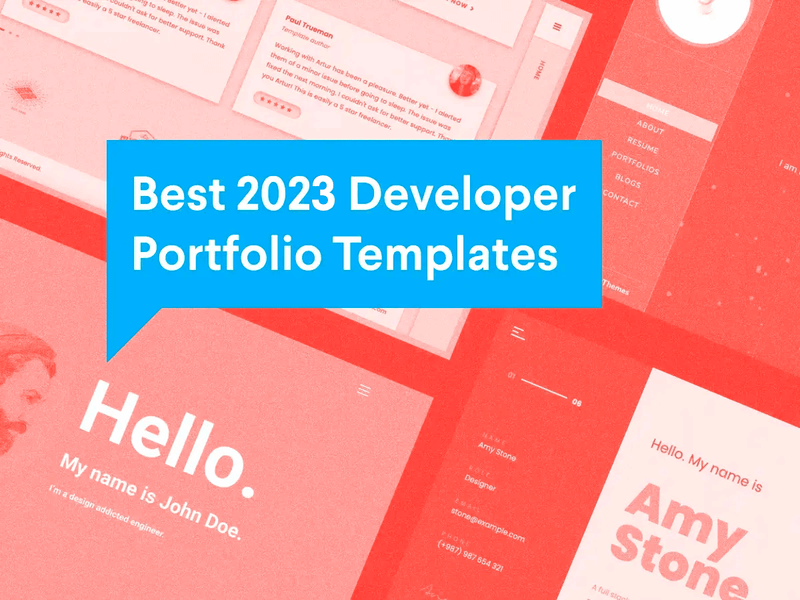How to use SVGs in React
This article will explore how to use SVG in React in three examples
Go to How to use SVGs in ReactYou are a quality web developer. So why waste time reinventing the wheel writing boilerplate code for your personal portfolio when you could be working on more novel, challenging problems?
These six portfolio templates for developers get your portfolio started in less time, with bespoke options, and set the stage for you to put your best foot forward and shine.
Pair them with a Sanity Studio back end and enjoy a powerful, ergonomic developer experience.

One challenge that comes with using decoupled cloud-based CMSes like Sanity for your content needs is you sometimes don't know where to start with your front end presentation for a landing page.
Because you've got nearly unlimited flexibility in how you consume data from the composable content cloud, the variety of choices can be dizzying.
So why not get started with someone else's template and hack your way forward from there?
Whether you're starting a job search or just showing off your professional achievements, the following portfolio templates for developers can give you a great beginning.
Wire your site up to consume content from Sanity, and you'll have a polished, low-maintenance experience on your back end which can easily be consumed by a new, different front end provider down the road.
This snazzy portfolio, built by Kenyan developer Shaquille Ndunda, delights with its use of animation and other impressive front end effects.
Styled tastefully with Tailwind, Ndunda's site shows off his React skills with a contact form and implements an innovative single-page scrolling layout.
He makes great use of Three.js and Framer Motion, so if you'd like to get some more practice with these 3D and animation libraries, give this one a try!
Instructively designed, this clean developer portfolio from Sri Lankan programmer Tharindu Madhusanka does a great job of teaching you how it's built. Such a portfolio is a great way to hone your React.js skills while cloning and customizing the site.
The site comes with an extensive README, so you can really wrap your entire mind around its construction and maximize your learning.
This quirky, personable dev portfolio from 20-year-old Guatemalan Sara Echevarría is a great example of how to let your personality shine through in your web presence. Much like Ndunda's site above, Sara's deft use of animation helps show off many of her skills at once–a good thing to do if you're trying to wow potential employers with your portfolio!
Sara's site is also written in React.
Looking to try out a newer framework? Get acquainted with Svelte with this ultra slick portfolio starter from Tunisian developer Riadh Adrani.
Cover all bases of your job applications with sections for skills, projects, and experience.
Also, impressively, this starter comes with dark mode support and a search feature! A great resource if you're hoping to flex your Svelte chops.
If you're ready to branch out into the Astro framework, Remi Wg's smooth boilerplate is a great place to get started.
Enjoy the famously fast and developer-focused framework with a simple site that supports projects, blog posts, and an email newsletter signup.
Want something ultra clean, simple, and official? Look no further than Vercel's own minimalist blog and portfolio Next.js starter.
Get to work on customizing your site without any of the tedium of deleting boilerplate.
Even better, Vercel's Visual Editing feature for Sanity sites makes powerful live editing functionality available with minimal set-up.
No one wants to lose valuable time in a job search performing repetitive coding tasks they've done a million times before. Using portfolio website templates makes it easier to create an appealing developer portfolio in less time and get on to the interesting problems.
After you've customized your portfolio to your liking, connect the front end to Sanity's back end and enjoy a powerful, ergonomic content experience.
Sanity makes it easy to grok how it's done via numerous guides like this one. You can also visit the extensive docs to troubleshoot any problems.
Sanity Composable Content Cloud is the headless CMS that gives you (and your team) a content backend to drive websites and applications with modern tooling. It offers a real-time editing environment for content creators that’s easy to configure but designed to be customized with JavaScript and React when needed. With the hosted document store, you query content freely and easily integrate with any framework or data source to distribute and enrich content.
Sanity scales from weekend projects to enterprise needs and is used by companies like Puma, AT&T, Burger King, Tata, and Figma.
This article will explore how to use SVG in React in three examples
Go to How to use SVGs in ReactLearn how to hook up a Telegram chatbot to Sanity using Node.js in this short, snappy tutorial.
Go to How to create a Telegram bot with Node.js and SanityBuild a full-fledged, user-authenticated To-do app using Sanity, Next.js, and Magic.link.
Go to How to Create a Todo List with React and SanityIn this tutorial, we'll make a no-frills "merch store" for a personal blog using the Stripe API, Next.js, and Sanity. We'll leverage Stripe's fantastic checkout platform to redirect our customers to Stripe's servers for their checkout process.
Go to Build an e-commerce site with the Stripe API